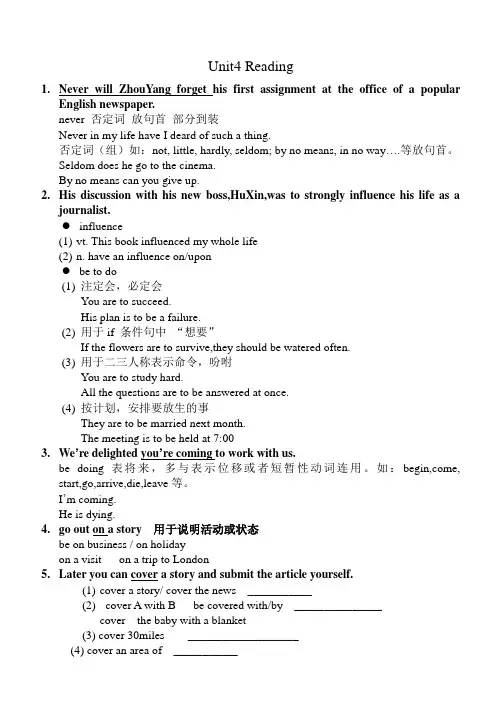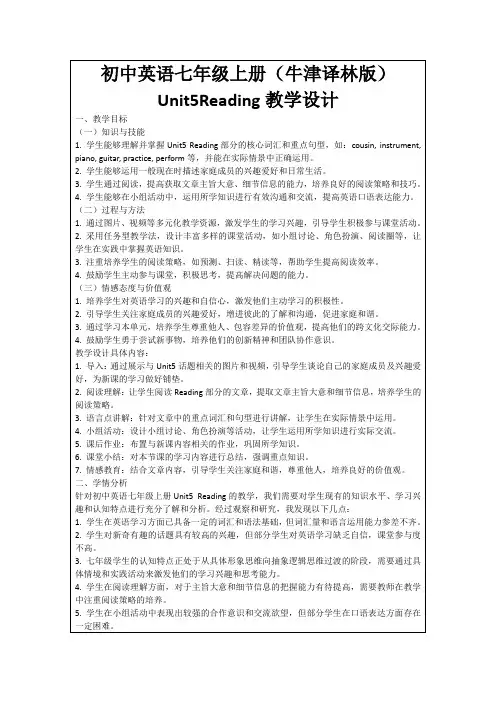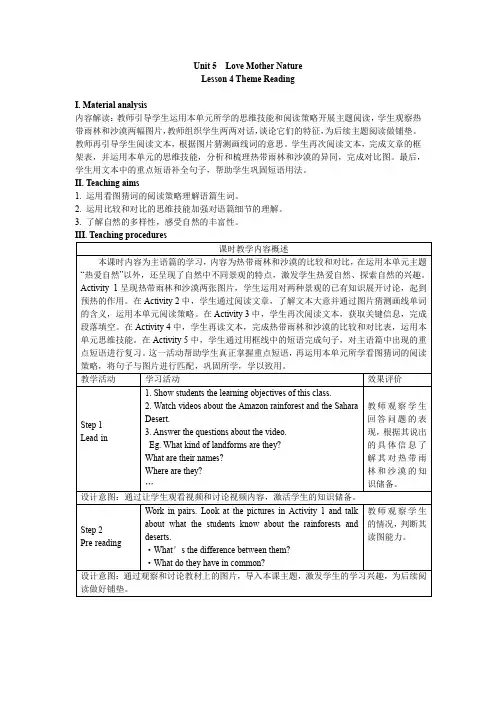阅读unit 5-reading 4
- 格式:doc
- 大小:69.00 KB
- 文档页数:6

Unit4 Reading1.Never will ZhouY ang forget his first assignment at the office of a popularEnglish newspaper.never 否定词放句首部分到装Never in my life have I deard of such a thing.否定词(组)如:not, little, hardly, seldom; by no means, in no way….等放句首。
Seldom does he go to the cinema.By no means can you give up.2.His discussion with his new boss,HuXin,was to strongly influence his life as ajournalist.●influence(1)vt. This book influenced my whole life(2)n. have an influence on/upon●be to do(1)注定会,必定会Y ou are to succeed.His plan is to be a failure.(2)用于if 条件句中“想要”If the flowers are to survive,they should be watered often.(3)用于二三人称表示命令,吩咐Y ou are to study hard.All the questions are to be answered at once.(4)按计划,安排要放生的事They are to be married next month.The meeting is to be held at 7:003.W e’re delighted you’re coming to work with us.be doing 表将来,多与表示位移或者短暂性动词连用。








Unit 5 Love Mother Nature
Lesson 4 Theme Reading
I. Material analysis
内容解读:教师引导学生运用本单元所学的思维技能和阅读策略开展主题阅读,学生观察热带雨林和沙漠两幅图片,教师组织学生两两对话,谈论它们的特征,为后续主题阅读做铺垫。
教师再引导学生阅读文本,根据图片猜测画线词的意思。
学生再次阅读文本,完成文章的框架表,并运用本单元的思维技能,分析和梳理热带雨林和沙漠的异同,完成对比图。
最后,学生用文本中的重点短语补全句子,帮助学生巩固短语用法。
II. Teaching aims
1. 运用看图猜词的阅读策略理解语篇生词。
2. 运用比较和对比的思维技能加强对语篇细节的理解。
3. 了解自然的多样性,感受自然的丰富性。
IV. Blackboard design。


Unit 5 Fun Clubs 拓展阅读专项主题:多彩、安全、有意义的学校生活Environment Club读前预热语篇品读In most parts of the world, many students help their schools make less pollution. They join environment(环境)clubs. In an environment club, people work together to make our environment clean.Here are some things students often do.No-garbage(无垃圾的)lunches. How many lunch bags do you throw away after lunch? Environment clubs ask students to bring their lunches in bags that can be used again. Every week they will choose the classes that make the least garbage and report them to the whole school.No-car day. On a no-car day, nobody comes to school in a car including the students and the teachers. Cars give pollution to us, so remember:Walk, jump, bike, or run!Use your legs! It’s lots of fun!Turn off the water. Do you know that some toilets can waste twenty to forty cubic(立方)metres of water an hour? In a year, that would fill in a small river. In the environment clubs, students mend(修理)those broken toilets.We love our environment. Let’s work together to make it better.在世界上大多数地区,有很多学生都在帮助他们自己的学校减少污染。
人教版高中英语必修一Unit5_Reading阅读训练课文理解Word版含答案课文理解-Unit 5 Reading阅读训练I.阅读理解(根据课文内容选择正确答案)(1) What’s the author’s purpose of writing the passage?A. To describe his terrible childhood life.B. To prove violence is a proper way to a fair society.C. To describe his experience in memory of Mandela.D. To draw people’s attention to poor conditions of the black.(2) Why did Elias need Mandela’s help?A. Because he had little education.B. Because he was a black worker.C. Because he didn’t speak English.D. Because Mandela was his lawyer.(3) People without a passbook may ________.A. not be allowed to live in JohannesburgB. be out of workC. be those who were not born thereD. all the above(4) What did Elias do to help Mandela?A. He killed some white officials.B. He broke the traffic laws.C. He blew up some government buildings.D. He organized a group.(5) From Mr. Mandela’s saying, we can get such a conclusion that ________.A. Mr. Mandela wanted to break the law in a violent way in the beginningB. black people had been given more rightsC. black people should rise up to fight for their own rights after years of being ruledD. they could force the government to give up easily参考答案:I. (1)-(5)CCDDB。
Unite4 Electronic Information(robots)Remote-controlled Robot Surrogate Could Attend Your Next Meeting. for You(译文见下端)1It may look like a floor lamp mounted on a vacuum claener , but Anybots Inc.'s new QB is actually the latest in surrogate robotics . QB is designed to serve as your eyes ,ears and voice when you can't be there in person ,Even better , it's mobile , rolls around on two wheels like Rosie and can be navigated remotely via the Web and a Wi-Fi connection .2Telecommuting workers and traveling executives alike could us QB (so named because it is the next in line after the company's prototype QB bot) as a virtual extension of themselves. allowing them to attend meetings , tour facilities or perform walk-throughs of real estate properties , all while controlling the robot from a computer keyboard.3Anybots formally unveiled the remotely controlled robot on Tuesday and plans to start selling QBs by the end of the year .A five-megapixel vedio camera serves as one eye, whlie the other is a laser pointer. A speaker on the crown of QB's head gives it a mouthpiece, a touch-screen monitor on on its forehead enables software maintenance and other input , and a ring of protective rubber around its head makes it look a bit like Olivia Newton-John circa 1981.4Along with the wheels,a self-balancing system and a motor with a top speed of five kilometers per our make the robot mobile . The two-wheel-as opposed to a tricycle or quad-design makes it more maneuverable in tight spaces and helps keep its weight down to about 16 kilograms . The area between the QB's head and base consists of a length of telescoping plastic that can be adjusted to let the QB stand as tall as 175 centimeters or as short as 81 centimeter.5Although it's unclear if the capacity for remote operation. willUS$15,000 Price tag .Anybots believe its technology will appeal to a new generation of workers who expect to be in contact at all times and in all places .The QB is designed to enable this connectivity without sacrificing “presence”,says Bob Christopher,president and chief operating officer of Anybots ,based in Moutain View,Calif . Bandwidth speed and vedio quality continue to improve , but they can’t replace being there , he adds .A test-drive reveals valuable Wi-Fi lesson6 To see how this might work in practice , Scientific American test-drove (from our editorial offices in New York) a QB located at Anybots’s facility in California . Our mossion was to drive across the building’s lobby and ask a second QB (remotely controlled by an Anybots employee) where we could find Erin Rapacki , who does product development for the company , and then proceed to Erin’s location. The session began with logging on to a website set up by Anybots and selecting the IP address of the QB we were to inhabit.7 Once our robot “woke up” and connected to Anybots’s local Wi-Fi network, we used the arrow keys on our keyboard to navigate the QB across the lobby. The controls take some getting used to. Particularly because rugs and other materials on the floor may prevent the Qb from travelling a completely straight line . We easily found the other QB but had difficulty aligning our camera so that we were staring directly into the other QB’s camera. This wasn’t necessary , because we could hearthe person controlling the other QB loud and clear through the microphone on our robot. Using the arrow keys,we were able to swivel our QB to the left and follow the relatively basic directions we had been given to our destination.8 With a bit more practice, navigation would have been smoother, THE QB features a buit-in lidar(light detection and ranging) system that warns the robot when it is getting too close to an object and slows the robot down to avoid(or at least reduce the impact of) a collision. The QB also has a camera located on the bottom of its “”chin” that points down at its wheels so you can see whether you’re about to drive over a lower obstacle(such as someone’s foot).9 The QB’s laser-pointer eye turned out to be useful when greeting people we encountered, including Anybots founder and CEO Trevor Blackwell, who accepted a laser beam in the palm of his hand in lieu of a handshake (a relief ,since the QB has no hands).10 By the time we were ready to leave , we were able to drive our QB back to the Anybots lobby and out the front door. Just past the building’s threshold, we learned a valuable lesson in surrogate navigation: never drive outside the range of your Wi-Fi network. A dropped connection means no cameras and no control over the robot’s navigation, which was especially unfortunate in our case because we were approaching the top of a ramp down to the parking lot when we lost the signal.11 Danger,Will Robinson.Unit4译文今后远程控制的代理机器人可以为您参加的会议它可能看起来像装在一个真空吸尘器落地灯,但实际上它是Anybots公司最新的代理机器人的QB。
Book 5 Unit 4 ReadingI. Nothing is too difficult if you put your heart into it.①全神贯注于concentrate on ②参加一门业余课程take an amateur course③通知某人某事inform sb of sth ④记住、记在心里keep (sth) in mind⑤确保、弄清楚make sure ⑥依赖、依靠depend on⑦记笔记take notes ⑧诀窍 a trick / tricks of the trade⑨否定做某事deny doing ⑩盼望做某事look forward to doing○11在……前面ahead of 最后last of all○13get sth straight 清楚无误地了解get the wrong end of the stick 完全误解,弄错II.Language points1. ①Never will Zhou Yang forget his assignment at the office of a popular Englishnewspaper.②Only if you ask many different questions will you acquire all the information you need toknow.③Not only am I interested in photography, but I took an amateur course at university toupdate my skills.④Here comes my list of dos and don’ts: (全倒装)2. His discussion with his new boss,Hu Xin, was to strongly influence his life as a journalist.◆be to do sth(1) 表示按安排或计划即将发生的动作。